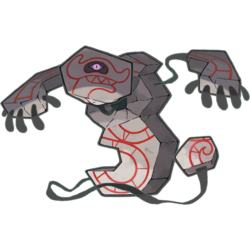From Bulbapedia, the community-driven Pokémon encyclopedia.
|
|
| Line 220: |
Line 220: |
| |type1-1=Ground | | |type1-1=Ground |
| |type2-1=Ghost | | |type2-1=Ghost |
| |evo1=<br>Travel under the stone bridge<br>in {{color2|000|Dusty Bowl}} after taking at least<br>49 damage from a attacks without {{color2|000|fainting. Self-inflicted damage doesn't count}} | | |evo1={{bag|Focus Sash}}<br>Travel under the stone bridge<br>in {{color2|000|Dusty Bowl}} after taking at least<br>49 damage from a attacks without {{color2|000|fainting. Self-inflicted damage doesn't count}} |
| |no2=867Runerigus | | |no2=867Runerigus |
| |name2=Runerigus | | |name2=Runerigus |
Revision as of 06:17, 21 December 2019
Runerigus (Japanese: デスバーン Desubān) is a dual-type Ground/Ghost Pokémon introduced in Generation VIII.
It evolves from Galarian Yamask when the player travels under the stone bridge in Dusty Bowl after Yamask takes at least 49 HP in damage (even if healed) without fainting.
Biology
In the anime
Major appearances
Minor appearances
In the manga
In the TCG
Game data
Pokédex entries
| This Pokémon was unavailable prior to Generation VIII.
|
| Generation VIII
|
|
|
Galar
#328
|
| Sword
|
A powerful curse was woven into an ancient painting. After absorbing the spirit of a Yamask, the painting began to move.
|
| Shield
|
Never touch its shadowlike body, or you'll be shown the horrific memories behind the picture carved into it.
|
|
|
Game locations
| This Pokémon was unavailable prior to Generation VIII.
|
|
|
Stats
Base stats
| Stat
|
Range
|
| At Lv. 50
|
At Lv. 100
|
58
|
|
118 - 165
|
226 - 320
|
95
|
|
90 - 161
|
175 - 317
|
145
|
|
135 - 216
|
265 - 427
|
50
|
|
49 - 112
|
94 - 218
|
105
|
|
99 - 172
|
193 - 339
|
30
|
|
31 - 90
|
58 - 174
|
Total: 483
|
Other Pokémon with this total
|
- Minimum stats are calculated with 0 EVs, IVs of 0, and (if applicable) a hindering nature.
- Maximum stats are calculated with 252 EVs, IVs of 31, and (if applicable) a helpful nature.
|
Type effectiveness
| Under normal battle conditions in Generation IX, this Pokémon is:
|
|
|
|
|
|
|
|
|
|
|
|
|
Learnset
|
|
|
|
- Bold indicates a move that gets STAB when used by Runerigus
- Italic indicates a move that gets STAB only when used by an Evolution of Runerigus
|
|
|
|
|
- Bold indicates a move that gets STAB when used by Runerigus
- Italic indicates a move that gets STAB only when used by an Evolution of Runerigus
|
|
|
|
|
- Moves marked with an asterisk (*) must be chain bred onto Runerigus in Generation VIII
- Moves marked with a double dagger (‡) can only be bred from a Pokémon who learned the move in an earlier generation.
- Moves marked with a superscript game abbreviation can only be bred onto Runerigus in that game.
- Bold indicates a move that gets STAB when used by Runerigus
- Italic indicates a move that gets STAB only when used by an Evolution of Runerigus
|
|
|
|
|
- Bold indicates a move that gets STAB when used by Runerigus
- Italic indicates a move that gets STAB only when used by an Evolution of Runerigus
|
|
|
|
|
- Bold indicates a move that gets STAB when used by Runerigus
- Italic indicates a move that gets STAB only when used by an Evolution of Runerigus
|
Evolution
Trivia
Origin
Runerigus may be based on the Ingvar rune stones, large stones engraved by Vikings used to commemorate the lives of notable people and events such as the Swedish Viking expedition to the Caspian Sea. Many of the rune stones discovered had a snake motif. Rune stones were also believed to have mystical properties that conveyed powers of protection, wealth, and victory. It may also be based on Apophis, the Egyptian God of chaos, who was often represented as a serpent.
Name origin
Runerigus may be a combination of rune and egregious or Cofagrigus.
Desubān may be a combination of death and 板 ban (slab).
In other languages
| Language
|
Title
|
Meaning
|
 Japanese Japanese
|
デスバーン Desubān
|
From death and 板 ban
|
 French French
|
Tutétékri
|
From Tutankhamun and a pun of tout est écrit
|
 Spanish Spanish
|
Runerigus
|
Same as English name
|
 German German
|
Oghnatoll
|
From Ogham, toll, and a pun of Och, na toll!
|
 Italian Italian
|
Runerigus
|
Same as English name
|
 Korean Korean
|
데스판 Deseupan
|
From death and 판 (板) pan
|
 Mandarin Chinese Mandarin Chinese
|
死神板 Sǐshénbǎn
|
From 死神 sǐshén and 板 bǎn
|
 Cantonese Chinese Cantonese Chinese
|
死神板 Séisàhnbáan
|
From 死神 séisàhn and 板 báan
|
|
|
|
|
|
|
|
Related articles
External links

|
This Pokémon article is part of Project Pokédex, a Bulbapedia project that aims to write comprehensive articles on each Pokémon species, as well as Pokémon groups and forms.
|



